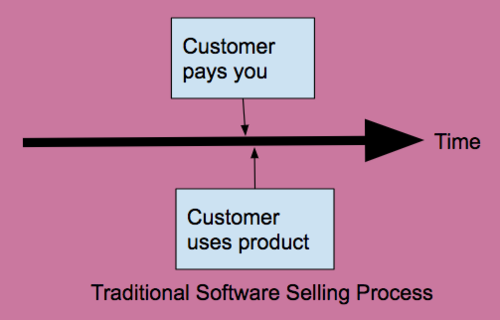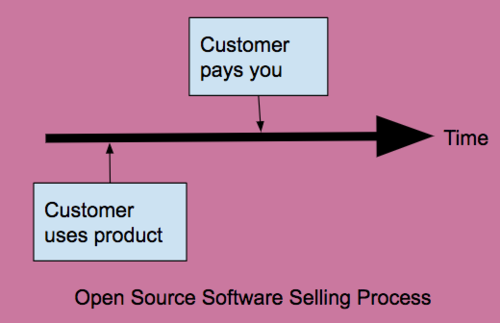If someone owes you $5.35 and hands you a $20 bill,
every reader of this blog can easily make change. You have a
calculator, a cash register, or you do it in your head.
However there is a faster way that I learned when I was 12.
Today it is rare to get home delivery of a newspaper, but if you do,
you probably pay by credit card directly to the newspaper company.
It wasn't always like that. When I was 12 years old I delivered
newspapers for The Daily Record.
Back then payments were collected by visiting each house every
other week. While I did eventually switch to leaving envelopes
for people to leave payments for me, there was a year or so
where I visited each house and collected payment directly.
Let's suppose someone owed me $5.35 and handed me a $20 bill. Doing math in real time is slow and error prone, especially if you are 12 years old and tired from lugging newspapers around.
Instead of thinking in terms of $20 minus $5.35, think in terms
of equilibrium. They are handing you $20 and you need to hand back $20...
the $5.35 in newspapers they've received plus the change that will total $20 and
reach equilibrium.
So you basically count starting at $5.35. You say outloud, "5.35" then hand them a nickel and say "plus 5 makes 5.40".
Next you hand them a dime and say "plus 10 makes 5.50". Now you can hand them 50 cents, and say "plus 50 cents makes 6".
Getting from 6 to 20 is a matter of handing them 4 singles and counting out loud "7, 8, 9, and 10" as you hand them each single.
Next you hand them 10 and say "and 10 makes 20".
Notice that the complexity of subtraction has been replaced by counting,
which is much easier. This technique is less prone
to error, and makes it easier for the customer to verify what you are doing
in real time because they see what you are doing along the way. It is more transparent.
Buy a hotdog from a street vendor and you'll see them do the same thing. It may cost $3, and they'll count starting at 3 as they hand you bills, "3..., 4, 5, and 5 is 10, and 10 is 20."
I'm sure that a lot of people reading this blog are thinking, "But
subtraction is so easy!" Well, it is but this is easiER and less error prone.
There are plenty of things you could do the hard way and I hope you don't.
It is an important life skill to be able to do math without a calculator and this is one of the most useful tricks I know.
So why is this so important that I'm writing about it on my blog?
There are a number of memes going around right now that claim the Common Core
curriculum standards in the U.S. are teaching math "wrong". They generally
show a math homework assignment like 20-5.35 as being
marked "wrong" because the student wrote 14.65 instead of .05+.10+.50+4+10.
What these memes aren't telling you is they are based on a misunderstanding
of the Common Core requirements. The requirement is that students are to
be taught both ways and that the "new way" is such that that they can
do math without a calculator. It is important that, at a young age,
children learn that there are multiple equivalent ways of getting the
same answer in math. The multi-connectedness of mathematics is an
important concept, much more important than the rote memorization
of addition and multiplication tables.
If you've ever mocked the way people are being trained to "stop thinking
and just press buttons on a cash register" then you should look at this
"new math" as a way to turn that around. If not, what do you propose?
Not teaching them to think about math in higher terms?
In the 1960s there was the "new math" movement, which was mocked
extensively. However if you look at what "new math" was trying to do:
it was trying to prepare students for the mathematics required for the
space age where engineering and computer science would be primary
occupations. I think readers of this blog should agree that is a good goal.
One of the 1960s "new math" ideas that was mocked was that it tried to teach
Base 8 math in addition to normal Base 10. This was called "crazy"
at the time. It wasn't crazy at all. It was recognized by
educators that computers were going to be a big deal in the
future (correct) and to be a software developer you needed to
understand binary and octal (mostly correct) or at least have an
appreciation for them (absolutely correct). History has proven
they naysayers to be wrong.
When I was in 5th grade (1978-9) my teacher taught us base 8, 2 and 12.
He told us this was not part of the curriculum but he felt it was important.
He was basically teaching us "new math" even though it was no longer
part of the curriculum. Later when I was learning about computers
the concept of binary and hexadecimal didn't phase me because I had
already been exposed to other bases. While other computer science
students were struggling, I had an advantage because I had been exposed
to these strange base systems.
One of these anti-Common Core memes includes note from
a father who claims he has a Bachelor of Science Degree
in Electronics Engineering which included an extensive study of
differential equations and even he is unable to explain the
Common Core. Well, he must be a terrible engineer since the
question was not about doing the math, but to find the off-by-one
error in the diagram. To quote someone on G+, "The supposed engineer
must suck at his work if he can't follow the process,
debug each step, and find the off-by-one error."
Beyond the educational value or non-value of
Common Core, what really burns my butt is
the fact that all these memes come from one of 3 sources:
- Organizations that criticize anything related to public education while at the same time they criticize any attempt to improve it. You can't have it both ways.
- Organizations who just criticise anything Obama is for, to the extent that if Obama changes his mind they flip and reverse their position too.
- Organizations backed by companies that either benefit from ignorance, or profit from the privatization of education. This is blatant and cynical.
Respected computer scientist, security guru, and social commentator
Gene "Spaf" Spafford recently blogged "There is an undeniable, politically-supported growth of denial -- and even hatred -- of learning, facts, and the educated. Greed (and, most likely, fear of minorities) feeds demagoguery. Demagoguery can lead to harmful policies and thereafter to mob actions."
These math memes are part of that problem.
A democracy only works if the populace is educated.
Education makes democracy work.
Ignorance robs us of freedom because it permits us to be controlled by fear.
Education gives us economic opportunities and jobs, which permit us to maintain our freedom to move up in social strata. Ignorance robs people of the freedom to have economic mobility.
The best way we can show our love for our fellow citizens, and all people, is to ensure that everyone receives the education they need to do well today and in the future.
However it is not just about love. There is nothing more greedy you can do than to make sure everyone is highly educated because it grows the economy and protects your own freedom too.
Sadly, Snopes and skeptics.stackexchange.com
can only do so much. Fundamentally we need much bigger solution.








